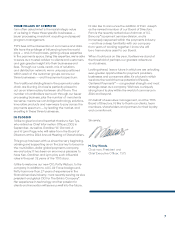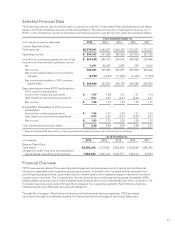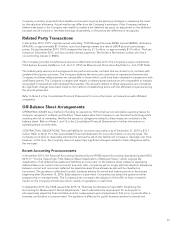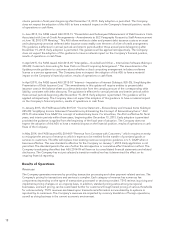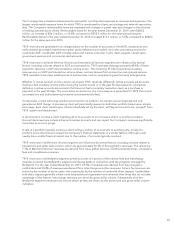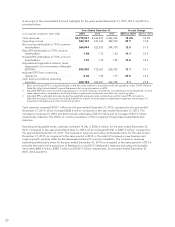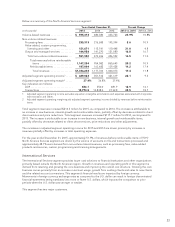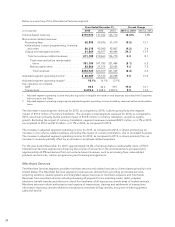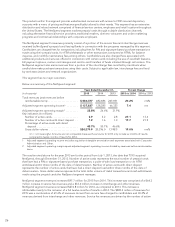NetSpend 2015 Annual Report Download - page 21
Download and view the complete annual report
Please find page 21 of the 2015 NetSpend annual report below. You can navigate through the pages in the report by either clicking on the pages listed below, or by using the keyword search tool below to find specific information within the annual report.Company considers projected future taxable income and ongoing tax planning strategies in assessing the need
for the valuation allowance. Actual results may differ from the Company’s estimates. If the Company realizes a
deferred tax asset or the Company was unable to realize a net deferred tax asset, an adjustment to the deferred
tax asset would increase or decrease earnings, respectively, in the period the difference is recognized.
Related Party Transactions
In December 2014, TSYS’ majority-owned subsidiary, TSYS Managed Services EMEA Limited (EMEA), obtained a
£900,000, or approximately $1.4 million, term loan bearing interest at a rate of LIBOR plus two percentage
points. During September 2015, TSYS increased the loan by £1.3 million, or approximately $1.9 million. The loan
matures in December 2017, and has monthly interest payments. The lender is Merchants Limited, who has a
noncontrolling interest in EMEA.
The Company provides miscellaneous services to Merchants Limited and to the Company’s equity investments,
Total System Services de México, S.A. de C.V. (TSYS de México) and China UnionPay Data Co., Ltd. (CUP Data).
The related party services and arrangements are performed under contracts that are similar to its contracts with
unrelated third party customers. The Company believes the terms and conditions of transactions between the
Company and these related parties are comparable to those which could have been obtained in transactions with
unaffiliated parties. The Company’s margins with respect to related party transactions are comparable to margins
recognized in transactions with unrelated third parties. The amounts related to these transactions are immaterial.
No significant changes have been made to the method of establishing terms with the affiliated companies during
the periods presented.
Refer to Note 4 in the Consolidated Financial Statements for more information on transactions with affiliated
companies.
Off-Balance Sheet Arrangements
OPERATING LEASES: As a method of funding its operations, TSYS employs noncancelable operating leases for
computer equipment, software and facilities. These leases allow the Company to use the latest technology while
avoiding the risk of ownership. Neither the assets nor obligations related to these leases are included on the
balance sheet. Refer to Notes 1 and 16 in the Consolidated Financial Statements for further information on
operating lease commitments.
CONTRACTUAL OBLIGATIONS: The total liability for uncertain tax positions as of December 31, 2015 is $13.1
million. Refer to Note 15 in the Consolidated Financial Statements for more information on income taxes. The
Company is not able to reasonably estimate the amount by which the liability will increase or decrease over time;
however, at this time, the Company does not expect any significant changes related to these obligations within
the next year.
Recent Accounting Pronouncements
In November 2015, the Financial Accounting Standards Board (FASB) issued Accounting Standards Update (ASU)
2015-17 “Income Taxes (Topic 740), Balance Sheet Classification of Deferred Taxes,” which requires the
classification of all deferred tax assets and liabilities as noncurrent on the balance sheet instead of separating
deferred taxes into current and noncurrent amounts. Also, companies will no longer allocate valuation allowances
between current and noncurrent deferred tax assets because those allowances also will be classified as
noncurrent. The guidance is effective for public business entities for annual and interim periods in fiscal years
beginning after December 15, 2016. Early adoption is permitted. Companies can adopt the guidance either
prospectively or retrospectively. The Company does not expect the adoption of this ASU to have a material
impact on the Company’s financial position, results of operations or cash flows.
In September 2015, the FASB issued ASU 2015-16 “Business Combinations (Topic 805): Simplifying the
Accounting for Measurement-Period Adjustments,” which eliminates the requirement for an acquirer to
retrospectively adjust the financial statements for measurement-period adjustments that occur in periods after a
business combination is consummated. The guidance is effective for public business entities for annual and
17


